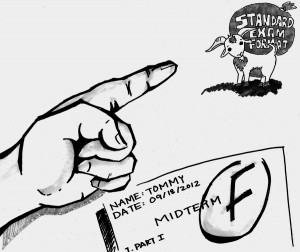Students can’t blame test formats
Many students today seem quick to deride traditional standardized examination formats as excuses for poor academic performances.
Advocates of eliminating standardized testing point to students inappropriately prioritizing their grades over attaining a balanced education, sometimes choosing to cheat in some form, either during in-class exams or — as we saw last week at Harvard University — by plagiarizing. As a result, universities across America are facing mounting pressures to “level the testing playing field” by finding methods to test students’ knowledge in more “fair” ways and by providing project extensions and longer testing times on an individual basis.
But the stresses of perhaps unfair universal standards model real-life circumstances, and universities shouldn’t enact poor policies in the hopes of protecting students from the challenges of objective assessments.
If we, as students, should take anything away from this recent economic downturn and its subsequent job-market difficulties, it is that learning only for the sake of learning isn’t a practical way to view higher education. It’s naive for students to spend their college careers under the assumption that the real world acts fairly and judges everyone individually, and it would be irresponsible for universities to promote this mindset.
It goes without saying that adhering solely to a test-centered mentality hardly fosters a healthy attitude toward ongoing education. Nevertheless, leveling the testing playing field to each student’s estimated ability is a blatant departure from the realities of the modern world of employment, which often pressures workers in standardized-test-like scenarios.
From an employer’s standpoint, standardized exams can provide the closest parallel to the expectations and standards of corporate America. Thriving companies look to recruit organized, quick-thinking students with keen analytical and reasoning abilities. In fact, many top banking and consulting firms conduct in-person interviews to seek out prospective interns and full-time hires who possess these traits.
In light of this, traditional standardized exams increasingly seem to be essential to the academic process, not only in terms of the style of testing but in that they force individuals to work within constraints and labor up to an objective standard expected of them. After all, companies don’t give extended deadlines to employees who find it difficult or stressful to concentrate — they expect the job to get done, and look for people who can execute on such demands. For university policy to ignore this does a disservice to our students by insufficiently preparing them for their futures.
There is no, nor should there ever be, a guaranteed formula for success in college. Some students can ace courses without opening textbooks while others labor arduously over class concepts every day and simply scrape by. Though this might be an unfortunate truth, it is not the university’s responsibility to ensure that students who study hard see their work pay off in the form of a high grade point average. In the end, getting the job done trumps the subjectivity of what constitutes hard work from person to person.
For better or worse, standardized tests reinforce this in our classrooms so that students can be fully prepared for the reality that lies ahead of them.
Ryan Townsend is a sophomore majoring in business administration. His column “The Blame Game” runs Tuesdays.

